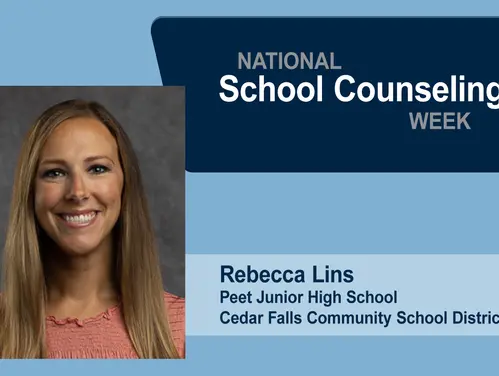It’s National School Counseling Week, which honors the important contribution of school counselors in our schools and the significant impact they have in supporting students. This week, we salute Iowa’s nearly 1,400 school counselors.
Each day this week, we will highlight a school counselor from across the state.
Today we focus on Rebecca Lins, who counsels at Peet Junior High School in the Cedar Falls Community School District. She has counseled for 17 years.
What attracted you to counseling?
I was attracted to counseling in general because I knew I wanted to work with kids in an intentional and impactful way. I was always drawn to helping professions, but school counseling has been a fusion of passions: working with students and small groups, working in a school setting with a team of educators, and creating positive change through advocacy, leadership and collaboration.
Over the years, counseling has expanded to include many different things. How do you juggle it?
Yes, the role of the school counselor has evolved through the years and I think more than ever, others have a better idea of what we do! To juggle the “hats” we wear, it takes planning, preparation and intentional organization. Our National Model recommends 80 percent of our time being in direct and indirect services. This determines my planning for classroom instruction, small group and individual counseling. It also guides my time spent consulting, collaborating and referring. The other 20 percent is for program management and fair-share responsibilities. I work with a great staff where we compliment each other in our skill sets, and with that, can help each other keep this balance. Some parts of the year we are balancing more scheduling duties and our weekly schedules adjust to fit this priority. We find our rhythm, it doesn’t mean it’s perfect, but the planning helps us best meet the needs of our students, school and school counseling program!
What’s the most satisfying part of your job? Can you name something specific that sticks out in your mind?
The most satisfying part of my job is working with the kids! Junior high can be a turbulent time and we are able to come alongside kids and help them through hard decisions and difficult dynamics. I also am grateful to work as part of an amazing team of people that care deeply for these kids. Our collective commitments to what’s best for kids make this work very fulfilling.
Something specific that sticks out is how crucial relationship building is with students. We had chronically absent students who now have better attendance because we have been able to foster a sense of belonging to our school environment, we notice when they’re gone and we care that they are here! Oftentimes, our department is working to meet those basic physiological needs so that students can engage in their learning.
What are your biggest challenges?
One of the biggest challenges has been supporting student and staff mental health and well-being. With that, challenges of trauma, building resilience post-pandemic, student home life, as well as other adverse childhood experiences.
What do you know now that you wish you knew when you first became a counselor?
I would tell myself, that first year of counseling, that I don’t have to conquer it all in year one! I felt like I was trying to work toward a comprehensive program like it was a sprint and not a marathon. I wish I knew it took years to develop and implement a comprehensive, data-driven program. I wish I knew that knowing every kid’s name was top priority, they want to feel known! I wish I would have known, or given myself the grace, that I wouldn’t be able to fix everything or save everyone, and that it was enough if I did my very best.
What advice do you have for new counselors just entering the field?
My advice would be to do a few things very well instead of many things at mediocrity, and then, build off that mastery little by little and year by year. Find a mentor in our field and build that network so that you can ask questions and have resources! Learn every student’s name and call them by it, make them feel known – focus on building relationships! And last, establish a self-care regime now, this work is hard and compassion fatigue is real, figure out what fills your cup so that you can pour into others!
Subscribe to receive email updates from the Iowa Department of Education.
